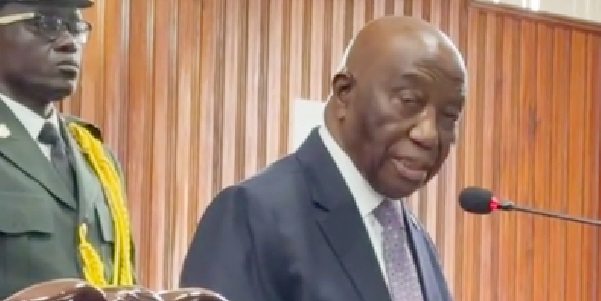Heritage News / 11/Mar/2025 /
"Rule of Law Third Pillar of Liberia's Future" President Boakai’s Bold Commitment to Justice and Development
In a influential speech delivered at the opening of the March 2025 Term of the Supreme Court of Liberia, President Joseph Nyuma Boakai Sr. emphasized the central role of the rule of law as the third pillar of his administration's ARREST Agenda for Inclusive Development.
In front of Chief Justice Sie-A-Nyene Yuoh, the Associate Justices, legal professionals, and government officials, President Boakai reaffirmed his government’s commitment to strengthening Liberia's judiciary, underscoring the necessity of a fully functioning and independent justice system to ensure the country’s continued progress.
“The Rule of Law is the third pillar in our ARREST Agenda for Inclusive Development,” President Boakai declared. “We intend to work with the judiciary to ensure that the requirements and conditions for a fully functioning judiciary are met. We pledge to play our part in ensuring your success.” With these words, the President signaled his determination to uphold justice and deliver on his promises to the Liberian people.
At the heart of President Boakai’s remarks was a clear call to action for the judiciary to remain impartial, efficient, and accessible, critical elements that contribute to the stability and growth of Liberia.
He stressed that a robust judicial system is indispensable for democracy, asserting that the rule of law is foundational for ensuring access to justice and sustaining the country’s overall development.
Acknowledging the legal legacy left by past Chief Justices Samuel Benedict and Louis Arthur Grimes, President Boakai recognized their vital contributions to Liberia's justice system.
These leaders’ efforts, he explained, continue to influence the judicial process today, and he urged the current judiciary to honor their work by delivering justice without fear or favor.
“The legacy of Chief Justices Benedict and Grimes is one of unwavering commitment to justice. Today, we are called upon to carry that legacy forward,” Boakai said, emphasizing the importance of consistency in upholding the principles of justice and fairness.
He added that the judiciary must remain independent, fearless, and transparent in all its dealings, particularly in cases of national importance.
The opening of the Supreme Court’s March Term marked the start of a new judicial cycle. During this term, the Court is set to hear and deliberate on critical cases that could shape the future of the nation.
In this context, President Boakai's remarks underscored his administration’s deep interest in ensuring the judiciary functions without hindrance, a necessary condition for progress in all sectors of society.
President Boakai reiterated that under the ARREST Agenda, which stands for Agriculture, Roads, Rule of Law, Education, Sanitation, and Tourism, the rule of law was not just a component but a central pillar of the national development framework.
The President described the agenda as a comprehensive blueprint that will guide Liberia towards inclusive and sustainable development.
By prioritizing the rule of law, President Boakai aims to build public confidence in Liberia’s legal system.
He recognized that the people’s trust in the judiciary is vital for national cohesion and progress, emphasizing that only a transparent and accountable judiciary can provide the stability needed to foster economic and social growth.
The President’s speech also outlined his administration's commitment to ensuring that judicial reforms, including improved access to legal resources and strengthening judicial infrastructure, are central to the development agenda.
President Boakai noted that improving the judicial system would contribute significantly to ensuring that all Liberians, regardless of their socio-economic status, can access justice equitably.
Boakai’s address comes at a critical time for Liberia, as the country continues to navigate challenges related to governance, corruption, and political instability.
His leadership in promoting the rule of law is seen as a positive step towards uniting the country and ensuring that its legal institutions remain strong, accountable, and able to meet the needs of the people.
During the address, President Boakai also reaffirmed his government’s commitment to the overall development of Liberia through the ARREST Agenda.
While much attention has been focused on agriculture, roads, and education, Boakai made it clear that none of these goals could be achieved without a sound and functioning judicial system.
A strong legal framework, he noted, ensures that the country remains on the path to lasting peace and prosperity.
The President’s words were well-received by the audience, many of whom see the reinforcement of the rule of law as a necessary prerequisite for Liberia’s progress. With the March Term now in session, the judiciary is poised to play a key role in addressing several high-profile cases that have the potential to shape the political and economic landscape of the nation.
President Boakai’s remarks also come in the wake of growing calls for judicial reforms in Liberia. Critics have long argued that the country’s legal system suffers from delays, inefficiencies, and a lack of transparency.
The President's focus on reforming the judiciary could signal a new era of accountability and fairness for Liberia's justice system.
In closing, President Boakai called on all Liberians to unite in support of the rule of law, pledging that his administration would continue to collaborate with the judiciary to ensure that the country’s legal system becomes more efficient, accessible, and responsive to the needs of the people.
His vision for Liberia grounded in the principles of justice, transparency, and equity, is one that aims to elevate the country to new heights of prosperity and stability.
As the Supreme Court begins its March Term, all eyes are now on Liberia’s judiciary, with many hoping that President Boakai’s commitment to the rule of law will translate into tangible improvements in the country’s legal and judicial systems.

No Comment Yet!